
The dark green fritillary is a species of butterfly in the family Nymphalidae. The insect has a wide range in the Palearctic realm - Europe, Morocco, Iran, Siberia, Central Asia, China, Korea, and Japan.
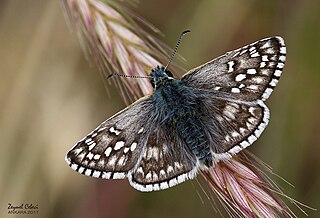
Pyrgus sidae, the yellow-banded skipper, is a species of skipper. It is found from the Iberian Peninsula through southern and eastern Europe, southeast France, the northwestern coastal areas of central Italy, then Istria and the Balkan peninsula, across Turkey, Transcaucasia, to Iran and Afghanistan. East of the Southern Ural Mountains the range extends to northwest Kazakhstan and the west of the Tien Shan in the north.

The scarce copper is a butterfly of the family Lycaenidae.
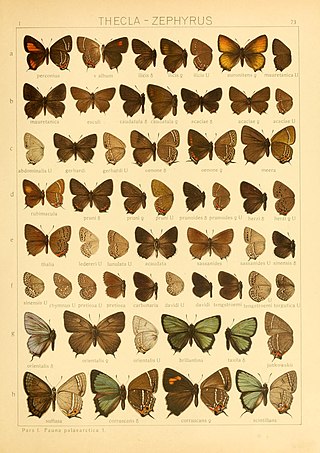
Satyrium ledereri, the orange banded hairstreak, is a butterfly in the family Lycaenidae.

The dusky large blue is a species of butterfly in the family Lycaenidae. It is found in Armenia, Austria, Azerbaijan, Belarus, Bulgaria, Czech Republic, France, Georgia, Germany, Hungary, Kazakhstan, Moldova, Montenegro, the Netherlands, Poland, Romania, Russia, Slovenia, Spain, Switzerland, and Ukraine.

Archon apollinaris is a species of butterfly in the family Papilionidae. It is found in Iran, Iraq, Syria, and Turkey.Seitz states-In the North-East of Asia Minor, Goman Olti, and in Armenia a usually smaller, pale and in both sexes sparsely marked mountain-form of Archon apollinus occurs, which is moreover characterized bya reduced marginal band of the hindwing; this is apollinaris Stgr. ; a dwarfed form of the female which is very deeply coloured in contrast to the ordinary form of the female of this subspecies may be called -ab. mardina, under which name it is already known in collections.
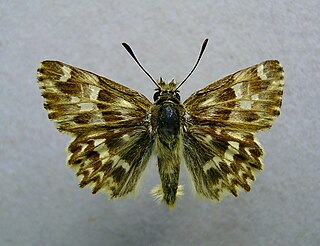
Muschampia lavatherae, the marbled skipper, is a butterfly of the family Hesperiidae. It is found from the Rhine Rift Valley in central Germany up to North Africa and from south-eastern France up to Anatolia.

Muschampia tessellum, the tessellated skipper, is a butterfly of the family Hesperiidae. It is found from the southern Balkan Peninsula through Ukraine, southern Russia and Asia Minor, southern Siberia, Mongolia, east to the Amur region.
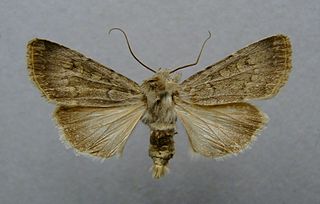
Euxoa decora is a moth of the family Noctuidae. It is found in southern and central Europe, Morocco, Algeria, the Caucasus, Armenia, Issyk-Kul, Turkey, Iran and Iraq.

Chazara persephone, the dark rockbrown, is a butterfly species belonging to the family Nymphalidae. It can be found from Crimea across the Caucasus and north of the Middle East to Iran; from the southern Urals across Kazakhstan to the southern Altai and west Siberia.
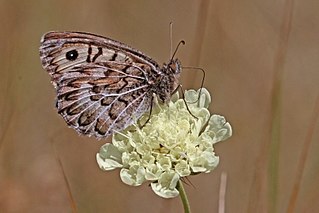
Pseudochazara geyeri, the Grey Asian grayling is a species of butterfly in the family Nymphalidae. It is confined to Albania, Greece, North Macedonia, eastern Turkey and south-western Transcaucasia.
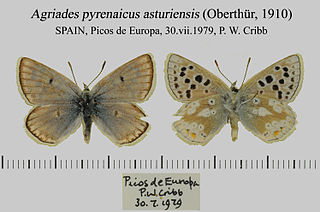
Agriades pyrenaicus, the Gavarnie blue, is a Palearctic butterfly of the family Lycaenidae. It is found in the Asturias mountains of north-western Spain, the Pyrenees, the southern Balkan Peninsula, Turkey, the Caucasus and Armenia. The habitat consists of alpine grassy rocky meadows where it is found at altitudes ranging from 1,500 to 2,200 meters.

Lysandra corydonius, the false chalkhill blue, is a butterfly of the family Lycaenidae. The species is distributed in south-eastern Europe, Caucasus, Transcaucasia, north-eastern Turkey, and north-western Iran. L.corydonius is very similar to Lysandra coridon but a slight violet sheen is present, especially in the outer area of the wings. It inhabits a wide variety of grasslands and woodlands. In Armenia it occurs from 1200 to 2000 m above sea level. The known larval host plants of the species in Turkey is Hippocrepis comosa, in the Caucasus - Coronilla varia. The species has not been assessed for the IUCN Red List. In Armenia from 2003 to 2013 its population increased.
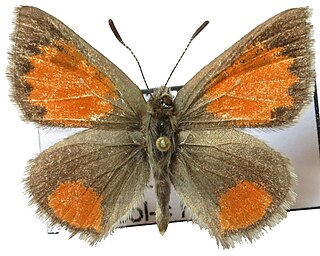
Tomares callimachus, the Caucasian vernal copper, is a butterfly of the family Lycaenidae. It is found in Anatolia, Iraq, Iran, the Caucasus, and Transcaucasia.
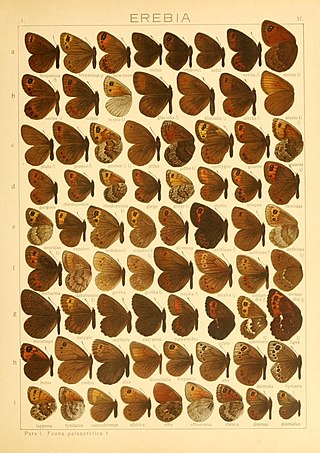
Erebia ottomana is a small butterfly found in the East Palearctic that belongs to the browns family.
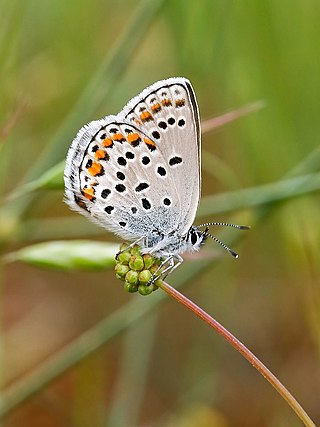
Kretania sephirus, previously known as Plebejus sephirus, is a species of butterfly that belongs to the family Lycaenidae. It is found in Eastern Europe, the Caucasus, and Asia Minor. The species is part of a species complex, with many members of the complex using variations of the name zephyr blue, including pylaon, trappi, and hesperica. The species, which previously belonged to the genus Plebejus, was moved to the genus Kretania following a 2013 molecular phylogenetics study of the subtribe Polyommatina. Many sephirus populations are threatened, and are legally protected in some countries, such as Hungary.

Kretania zephyrinus is a butterfly found in the East Palearctic that belongs to the blues family.

Cyaniris bellis, the Greek mazarine blue, is a butterfly found in the Palearctic that belongs to the blues family.
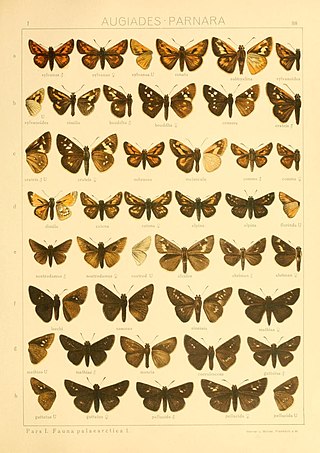
Eogenes alcides is a butterfly found in the East Palearctic Asia Minor to Iran, Afghanistan to Pakistan, West China. that belongs to the skippers family. Subspecies E. a. ahriman is found in Turkestan.

Leptidea duponcheli, the Eastern wood white, is a butterfly found in the Palearctic that belongs to the whites family.




















